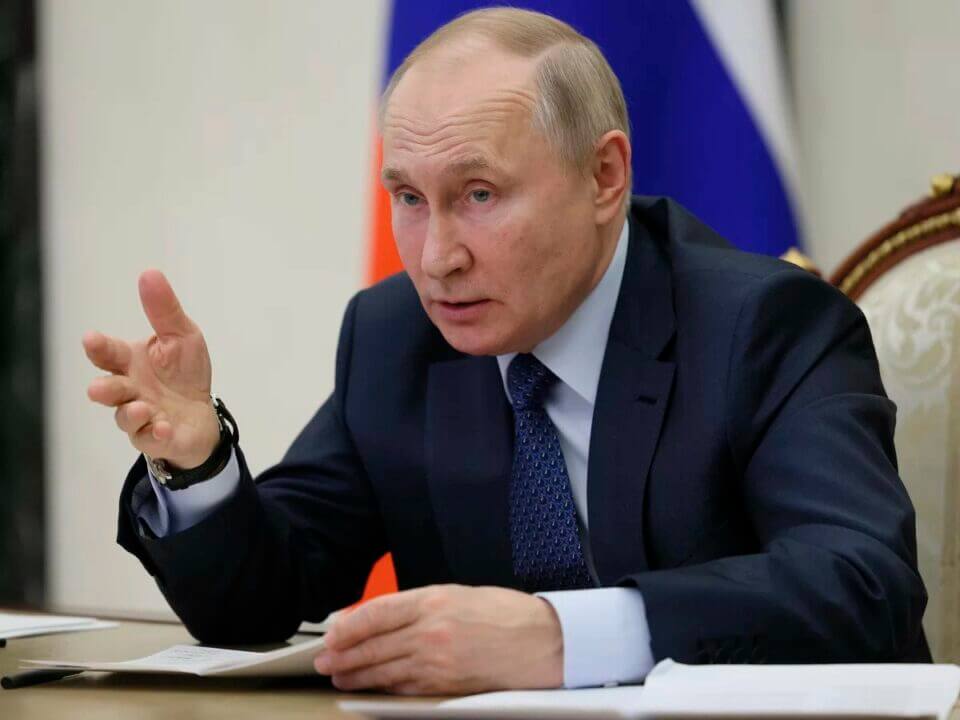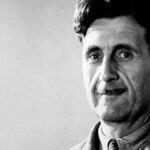
“The Rada’s final decree is a reproach to all those who think of Ukraine as nothing more than an appendage of Russia, without a culture and a history of its own.”
The Final Decree
It is January 22, 1918, and the government of Ukraine, the Central Rada, is facing annihilation by the invading Bolshevik forces.
In response to the February Revolution of 1917, which had abolished tsardom forever, the Ukrainian lands of the Russian Empire declared their freedom within a new democratic Russian state. The Rada was born of various Ukrainian political and cultural groups who came together in the wake of the February Revolution. It soon received the broad support of the Ukrainian people.
Mykhailo Hrushevsky, a renowned scholar and veteran of both the Ukrainian National Revival movement and the 1905 Revolution, was chosen to lead the Rada. Hrushevsky announced that the anti-Semitic pogroms of 1905 and earlier were not to be repeated. He also assured the Jews, Russians, and Poles of the land that they would be free to practice their culture in the new Ukraine.
When the communists overthrew the Provisional Government in Russia in October 1917, the Rada declared the Ukrainian People’s Republic an independent state, albeit one federated with Russia. The Rada and the Bolsheviks cooperated for a short time but soon found themselves in deadly opposition. The Rada claimed too much Ukrainian territory for the Bolsheviks’ liking, so the Bolsheviks announced the formation of the Ukrainian People’s Republic of Soviets in Kharkiv on Christmas Day of 1917. Then, they began moving troops towards Kyiv.
Now, on January 22, 1918, all but defenseless in the face of the Bolshevik onslaught, Hrushevsky and his comrades pen the fourth and final decree of the Central Rada: “The Ukrainian People’s Republic hereby becomes an independent, free, and sovereign state of the Ukrainian people, subject to no one.”
Poison and Antidote
Ever since reading about the Rada’s last decree in Professor Serhii Plokhy’s 2015 book The Gates of Europe: A History of Ukraine, I have fancied that it was intended not just as a rebuke to the Bolshevik invaders but to all invaders, past, present, and future. Here, a legitimate, popular, and independent Ukrainian government asserted for all time that Ukraine was free.
Did the historian Hrushevsky divine even then, as the Bolsheviks were marching to destroy the dream of an independent Ukraine, that whatever happened in his own day, his homeland would never be safe from its neighbor? If he did, he was correct. In the end, Ukraine was incorporated into the Soviet Union, and Ukraine’s ancient and distinctive culture, also the fount of modern Belarus and Russia, was suppressed. Ukraine would remain subjugated until 1991 when its people overwhelmingly supported national independence in a referendum—an act which hastened the final collapse of the Soviet empire itself.
Regardless of how farsighted the authors of that last decree were, their words remain with me now, as the (current) Russian invasion of Ukraine approaches its year-and-a-half anniversary. The Rada’s final decree is a reproach to all those who think of Ukraine as nothing more than an appendage of Russia, without a culture and a history of its own. That view was one of President Vladimir Putin’s justifications for invasion in the first place and is a standby of Russian propaganda. It is a view also shared by some in the West, sometimes out of innocent ignorance and sometimes out of mendacity.
The Gates of Europe and Plokhy’s new book, The Russo-Ukrainian War, are the antidotes to this poisonous lie. Unlike most books lauded with the stale phrase “essential reading,” these are utterly necessary if one wishes to understand what is happening in Ukraine today.
History in extremis
The Russo-Ukrainian War is more than just a scholarly achievement. It is also a testament to the fortitude of its author. Plokhy, who now holds the Mykhailo Hrushevsky professorship of Ukrainian history at Harvard University, is of Ukrainian extraction and spent most of his early life in Ukraine, where he still has family and friends. As he tells us in the preface to his new book, he was caught off guard by the Russian invasion of his homeland last February but soon realized that he could be of service to his country:
“How did all this happen? Neither emotionally nor professionally was I ready to think through and explain to myself and others what was going on as a result of Russia’s unprovoked aggression. Madness and criminality seemed the only rational explanations. But as the media kept reaching out to me for commentary, I felt that I could not refuse as my words might actually have some impact on the course of events. I realized that as a historian I could offer something that others lacked when it came to understanding the largest military conflict in Europe since World War II. Eventually I convinced myself that, to rephrase Winston Churchill, historians are the worst interpreters of current events except everyone else.”
Thus, the intellect of a great Ukrainian scholar is set against the revanchist barbarism of President Putin—how fitting. And how moving that a distinguished academic who (as he informs us in the acknowledgments section at the end of the book) has lost a cousin to the Russian invaders should be able to focus his mind and produce such a detailed and insightful work of scholarship in a very short period.
This is history in extremis. Usually, such history is shoddy and propagandistic, but Plokhy is neither. The Russo-Ukrainian War is erudite and balanced—and here I mean “balanced” in the true sense of the word, for Plokhy seeks to understand the motives behind the Russian invasion fully and truly, not to excuse or equivocate. Plokhy takes a “longue durée” view of history, going back more than a thousand years to set the context for the events of 2022 before zooming in on the past 30 years or so and examining in detail the first year of the current war (he is particularly good on the military aspects). He also takes a global view, analyzing what the war means for the post-Cold War world order.
In doing all this and more, Plokhy amply demonstrates that the Russian invasion of Ukraine is not a result of North Atlantic Treaty Organization (NATO) expansion or American perfidy, or any of the many other evasions which have been offered in pseudo-explanation. Its roots lie, rather, in one of the oldest and stupidest of human dreams.
The Old Dream
The Russian invasion of Ukraine happened because of President Putin’s intoxication with the old imperialist dream. Chechnya, Georgia, Ukraine: Everywhere President Putin goes, he goes to conquer and subjugate. He allies himself with vicious murderers like Bashar al-Assad and Xi Jinping who share his view of a “multipolar” world wherein the spread of degenerate liberal ideals will be halted, leaving swathes of the world under alternative civilizational paradigms (i.e., at the mercy of dictators and living in slavery). President Putin assassinates (or attempts to assassinate) dissidents living in foreign countries and gleefully interferes with the electoral processes of democratic nations he dislikes.
The origins of President Putin’s dream lie in the yearning for a restored Russian Empire. With the collapse of the Soviet Union, Russia’s importance on the world stage diminished. This was unbearable to President Putin, whose worldview was shaped by the KGB and the ideologues of Russian nationalism and imperialism. The roots of this tradition are traceable back to the medieval Grand Duchy of Muscovy and it was systematized in the 19th century by the Russian imperial statesman Sergey Uvarov.
Uvarov’s “Official Nationality” defined imperial identity as being based upon “Orthodoxy, Autocracy, and Nationality.” Religion, dictatorship, and the supremacy of Russian identity in the lands of Ukraine and Belarus were the hallmarks of a unique “Russian World.” Ukraine was essentially a province of Russia, nothing more, and any suggestions to the contrary were met with persecution, exile, and even execution under both the tsars and their Soviet successors (who gussied up their embrace of reactionary imperialism, perhaps convincing even themselves, in revolutionary garb).
President Putin’s indebtedness to several variants of this ideal is revealed in his intellectual inspirations. Consider his open admiration of various Russian imperialist thinkers such as Anton Denikin, Ivan Ilyin, and Ivan Shmelev, on whose graves he laid flowers in May of 2009. Sadly, one of the greatest opponents of Soviet tyranny is also among President Putin’s intellectual heroes. Aleksandr Solzhenitsyn was, says Plokhy, “[t]he key figure who linked the imperial thinking of the past with a plan for dealing with post-Soviet Russian challenges and realities.” In the 1990s, Solzhenitsyn variously called for a “Russian Union” and the annexation of parts of Ukraine. President Putin placed flowers on his grave, too.
President Putin’s war against Ukraine is also, in part, a holy war. Like the missiles with which he slaughtered Syrians, it has been blessed by the Russian Orthodox Church. Indeed, in his relentless bombing and near-destruction of Ukrainian cities, President Putin seems to be importing to Europe the brutal methods refined by his forces in Syria (the cataclysm he visited upon Aleppo was echoed in my mind by the obliteration of Mariupol last year).
President Putin sees himself as the restorer of a pure Russianness, one based on the rejection of secular and liberal modernity and in search of an imperium over which to rule. For him, Russia is the last great hope of true Christianity and traditional values and Moscow is the “Third Rome.” (Perhaps this is why, in an April, 2022 interview with The Atlantic, Ukrainian President Volodymyr Zelenskyy seemed to doubt that there was any real link between religion and morality.)
One particularly startling example of President Putin’s longstanding designs on Ukraine given by Plokhy is that, as far back as 2008, while Ukraine was trying to join NATO, President Putin proposed to several eastern European countries that they retake the parts of Ukraine they had once controlled. He likely aimed to carve a “New Russia” out of chunks of Moldova and Ukraine to act as a buffer state. Thankfully, the Polish officials who heard this offer were uninterested.
Before and after the invasion, President Putin reiterated his true motives. In a July, 2021 essay, inspired by the imperialist thinkers he most admired, he asserted that Russia and Ukraine were one and complained that independent Ukraine was an “anti-Russia” created by the West to undermine Russian unity. The democratic aspirations of the Ukrainian people, let alone the desire of many of them to be part of the liberal democratic world order, had no place in President Putin’s analysis. In June 2022, several months into the war, President Putin summoned the spirit of the great Russian empire builder Tsar Peter I to justify his actions: Just as Peter had restored Swedish lands to their true Russian owners, so President Putin in Ukraine was merely reclaiming what was rightfully Russia’s.
President Putin’s true motives are detailed extensively by Plokhy, making clear that the true cause of the invasion of Ukraine was revanchist Russian imperialism. For President Putin and his followers, Russia is a unique civilization, the antithesis of the Western liberal world, and Ukraine’s leaders have sacrificed Ukraine’s true spirit to please their Western masters. Thus, Ukraine must be liberated from and purged of degeneracy.
Ukraine Looks West
When Ukraine voted for independence in 1991, a new era seemed to beckon. For all its many imperfections, Ukraine, unlike Russia, steered a democratic path through the end of the 20th century and the beginning of the 21st. It resisted the blandishments and the threats of Moscow and embarked upon a relationship with the West. While Russia descended into dictatorship, Ukraine constantly reaffirmed its commitment to democracy.
Yes, Russia would keep attempting to undermine Ukrainian sovereignty (vide their likely poisoning of the Western-leaning presidential candidate Viktor Yushchenko in 2004). Yes, there would be scandal and corruption galore in Ukraine for a long time to come. And, yes, Ukraine would have its own struggles with democracy. But Ukraine, as Plokhy puts it, “managed to do what Russia was never able to achieve, handling a transfer of presidential power through free and fair elections.”
Indeed, while Ukraine stumbled along the path to freedom and modernity, Russia under Presidents Boris Yeltsin and Putin degenerated into autocracy and religious bigotry. A democratic neighbor was always a threat to an authoritarian Russia, and from the Orange Revolution of 2004 to the first invasion of Ukraine in 2014, President Putin has done his best to eliminate that threat.
Every time, though, Ukraine has resisted and held firm to its democratic ideals. Ukraine’s desire to join the European Union (EU) and NATO was freely chosen. And even if one grants President Putin’s excuse about NATO expansion in the argument over the war’s origins, one is still left with the fact that President Putin sees Ukraine as belonging to Russia’s sphere of influence and thus believes he ought to be able to dictate what Ukraine can and cannot do. So what if he felt threatened by NATO? His so-called legitimate security concerns do not grant him the right to veto membership of NATO or bully other nations into staying out of it.
The core issue is simple: President Putin has continually sought to undermine Ukrainian democracy and the self-determination of its people, and Ukraine has refused to bend the knee. The Orange Revolution and the Revolution of Dignity were genuine democratic uprisings by the Ukrainian people—however much President Putin wants to wish away Ukrainian agency and blame those revolutions on Western interference.
Varieties of Idiocy vis-à-vis Ukraine
It is not only President Putin who sees the malignity of the West at work in Ukraine, however. More than a few isolationists and so-called anti-imperialists on the Western Right and Left, respectively, more or less agree with the invader, as do supposed realist scholars like John Mearsheimer.
For these people, Russia has genuine grievances against the West, and its invasion of Ukraine is merely a rational reaction to these grievances. Any country, including the United States, would react in the same way if similarly threatened (in this analysis, there is no place for explanations based on the particular social and political cultures and ideologies dominant in different nations).
Illiberal right-wingers cannot stand the thought of a nation fighting staunchly for something as limp and degenerate as liberal democracy, let alone fighting for it along internationalist and progressive lines (compare, for example, the vicious homophobia of Russia with Ukraine’s comparative liberalism on LGBTQ+ rights). Some of them align with the anti-imperialist leftists (i.e., the ones who have yet to realize that the world has changed a little since the Cold War) in agreeing that the war is a proxy war provoked and perpetuated by the globalists led by the Great Satan: America. These are the sorts of people whose natural home is Compact, where risible titles like “Fueling Zelensky’s War Hurts America” can be published with a straight face.
To go into detail on the many ways in which all these people get it wrong is beyond my scope here. I shall, however, recommend three essays by the writer Matt Johnson which together elucidate and demolish the idiocies spawned by these three groups: “What the Left Keeps Getting Wrong About Ukraine”; “Mearsheimer: Rigor or Reaction?”; “Why Tucker Carlson Hates Ukraine So Much.”
However, since I belong to the Left, I will discuss its peculiar follies in a little more detail. Here is one of my favorite examples of leftist foolishness about Ukraine, from one Jason Melanovski of the World Socialist Web Site:
“The banning of the country’s largest opposition party marks the temporary culmination of an undemocratic campaign initiated by the Zelensky government against parties and individuals who could potentially undermine the war that Kiev is waging against Russia on behalf of the imperialist powers. [My emphasis]”
That last part, with its Orwellian reversal of the truth and its deliberate use of the Russian word for Kyiv, is slightly funny in its stupidity, but it also perfectly encapsulates how far gone some on the Left are. Even more allegedly respectable anti-imperialists like Noam Chomsky and Cornel West are barely able to conceive that the blame can lie solely with a non-Western country. One would not know from listening to such people that, as Plokhy reminds us, Ukraine either just before or just after the invasion reportedly offered a guarantee that they would not join NATO. So much for Russia’s legitimate security concerns!
For a certain type of left-wing anti-imperialist, it must always be the West at fault. No, the West cannot possibly be united in support of a victim against an aggressor! No, the people of Ukraine cannot have freely chosen to defend, with Western help, their country against an aggressor! No, they must have been duped by Western propaganda! And so on ad nauseam.
I need not bother describing how much this sorry excuse for leftist analysis shares with the worldview of the blood-soaked President Putin. Whence internationalism and solidarity? (A couple of important points here: to point out these similarities is not at all the same as accusing anyone of being a shill for President Putin. And to laud the West for its overall strong response to the invasion is not to valorize it—the anti-imperialists are correct that the United States, the West, and NATO still have many hypocrisies and crimes and failures to their name. It is just that this does not mean that everything they do is hypocritical, criminal, or a failure.)
I would like to ask the likes of Melanovski how they would respond to Taras Bilous. Bilous is a Ukrainian socialist on the frontlines of the war. Days after the beginning of the invasion, he wrote a coruscating critique of certain strands of anti-imperialism:
“This is part of the wider phenomenon in the Western ‘anti-war’ movement, usually called ‘campism’ by critics on the Left. British-Syrian author and activist Leila Al-Shami gave it a stronger name: the ‘anti-imperialism of idiots.’ Read her wonderful 2018 essay if you haven’t done so yet. I will repeat only the main thesis here: the activity of a large part of the Western ‘anti-war’ Left over the war in Syria had nothing to do with stopping the war. It only opposed Western interference, while ignoring, or even supporting, the engagement of Russia and Iran, to say nothing of their attitude to the ‘legitimately elected’ Assad regime in Syria…Unfortunately, we have seen the same ideological cliché repeated over Ukraine.”
I do not agree with everything Bilous says, but he is a socialist fighting for the freedom of his country against a genuinely—and brutally—imperialist invader. He is in favor of Western support for Ukraine. He has repeatedly called for solidarity from his Western comrades. And what does Jason Melanovski say? “Kiev” is the real villain. Melanovski and others like him ought to squirm in shame.
It is important to note, as Bilous does, that idiotic anti-imperialists are not representative of the entire Western left. They are probably a minority, and many on the Left have stood by Ukraine, even if that means accepting that Western power can be a force for good in the world. This is a much nobler leftism—and much more my kind (an article entitled “The Progressive Case for NATO” by Sam Hudson in Areo Magazine is the sort of thing I have in mind here). Bilous and others have also legitimately criticized President Zelenskyy for his government’s clampdown on workers’ rights. So, yes, one can be critical of Ukraine and its leaders while still supporting their fight for freedom and without turning into a foaming reactionary like Melanovski.
(And whatever criticisms one might have of President Zelenskyy, who can reasonably doubt his bravery? Told by Western friends to get out of Ukraine before Russia invaded, to abandon his people to slavery and save his own skin, he refused and stayed in Kyiv to inspire Ukrainian resistance. In this act of heroism, he exemplified the strength and defiance of the Ukrainian people.)
None of these issues is explicitly addressed by Plokhy, who confines himself to a direct analysis of the war and its background. But his analysis itself handily refutes anti-imperialists, isolationists, and realist academics alike—another excellent quality of his book.
An Enjoyable Backfire
The Russo-Ukrainian War is a global war. After President Putin’s invasion, the democratic world was united as never before in defense of Ukraine. This was probably not what President Putin imagined would happen. No doubt encouraged by the American withdrawal from Afghanistan in August of 2021 and no doubt feeling confident that his “special military operation” would topple President Zelenskyy in a matter of days, he likely believed that the West would respond as pathetically as it usually did to his crimes. How wrong he was.
President Putin’s monstrousness was evident long before February, 2022, yet the world did not want to see it. Opportunities to make money in Russia and the need for Russian gas encouraged appeasement. Oh yes, when President Putin invaded eastern Ukraine in 2014 and slaughtered countless innocent Syrians to protect his fellow dictator Assad and unleashed nerve agents on British soil against his enemies, swift and sure action was taken: A few sanctions were levied, some Russian diplomats were expelled, and invitations were withdrawn. But why poke the bear too much?
Not until the unprecedented economic sanctions against Russia following the 2022 invasion of Ukraine did democratic governments finally take a stand. Those sanctions, plus the massive military assistance to Ukraine, showed that the West was back and united in defense of democracy as it had not been since the end of the Cold War. All well and good, of course, but the failure to do anything remotely serious over the previous 20-odd years remains a very conspicuous and ugly stain.
Still, the unity and strength shown by the democratic world in response to the invasion of Ukraine is heartening. It is also a striking demonstration that the might of the democratic powers, lambasted by the anti-imperialist left for so long, can be used for good. Like it or not, and for all its many crimes and hypocrisies, American power remains the bulwark of liberty in the world. The Left, and everyone else, should be grateful for it in circumstances like these.
President Putin’s war, launched to crush Ukrainian distinctiveness and show the West who was boss, has resulted instead in the fierce resistance of the Ukrainian people to their “liberators” and the revival of liberal internationalism among the Western powers. And President Putin has managed to more than double the NATO border with Russia by scaring Finland into joining the alliance (and now Sweden looks set to join, too). Rarely do such gigantic backfires happen in history, and this is a most enjoyable one indeed.
(As an aside, a much less enjoyable irony is the destruction by Russian bombs of Russian speakers’ lives and Russian cultural sites in eastern Ukraine. So much for President Putin’s claim to be defending Russian speakers and Russian culture from a Ukrainian genocide.
An aside to the aside: In confronting an enemy nation, there is always a temptation to demonize the people and culture of that nation. Even if many Russians support President Putin’s war, this is a mistake. For one, there are the brave Russians who came out onto the streets to protest the war. And, on a deeper level, the best of Russian culture transcends the current regime. I am reminded here of the Spanish anti-Stalinist communist Andreu Nin, who was tortured and murdered by the NKVD during the Spanish Civil War. His translations into Catalan of Tolstoy and Dostoevsky were also the first.)
A Simple War
In the end, the rights and wrongs of the Russo-Ukrainian War are very simple: a democratic nation with a long multicultural history, struggling towards a progressive and internationalist future, was invaded by its fascistic, imperialist neighbor, which then proceeded to massacre its way through Ukraine and steal its children. The Ukrainian side is the only side to be on and the Ukrainian people should be supported for as long as they need and desire to be. Some things really are that simple.
And yet far too many people still insist on obfuscating this simple moral truth with talk of proxy wars and Western crimes. The balance of power must be maintained, intone the realists. The West is to blame, cry the anti-imperialists. Perhaps President Putin is onto something when he decries the degeneracy of the West, wonder the freethinking isolationist Right. (To those who fear that supporting Ukraine makes nuclear conflict more likely, I recommend reading Timothy Snyder’s analysis to understand not just why this is wrong but also how it gets things precisely the wrong way around.)
The Russo-Ukrainian War is about democracy, sovereignty, and internationalism. It should not be misused by ideologues of any variety to bolster their own worldview. I have seen, for example, the fight for Ukrainian sovereignty used by certain conservatives as a vindication of Brexit and a condemnation of globalism and international institutions. One wonders how they have failed to notice Ukraine’s oft-repeated desire to join the European Union—which, for all its flaws, is a truly inspiring and very successful democratic project.
If anything, Ukraine’s yearning for EU membership, so boldly asserted in 2014 and today, should have renewed Europeanism in Britain and elsewhere. (It is a nice irony that the disgraced leader of the Brexit charge, Boris Johnson, should have ended up as one of Ukraine’s staunchest allies. He is undoubtedly more popular in Ukraine than here in Britain and his support for Ukraine might well be the only thing he is remembered fondly for.)
As the battle for Ukraine rages on, with new developments arising every day (the counter-offensive and the Wagner mutiny, among many others), it might seem pointless for Serhii Plokhy to have written a history of the Russo-Ukrainian War. As I hope to have shown, it would be a mistake to think so. It is only in understanding the history of Ukraine and Russia that one can even begin to comprehend the momentousness of what is currently happening. In this, Plokhy is an excellent guide.
This war is a war of values, a war of narratives—and one side really is in the right and one side really is in the wrong. There should be no confusion about that. Simply “asking questions” or being “open-minded” is not an excuse for cowardice or evasion. This does not, however, mean that Ukraine is perfect. Just as one can legitimately criticize President Zelenskyy, one can criticize the Ukrainian side as a whole. Terrible things are done in war by all sides and should not be excused. But one side in this war is infinitely worse than the other, and only one side is possessed of a just cause.
This war matters. However it ends, the consequences will reverberate for a long time to come. Right now, as Plokhy argues, it seems that we are heading for a bipolar world (in more ways than one, I might add). China, which has benefited from Russia’s desperate sale of cheap gas, looks to be one of the biggest winners of the war (though they might now think again about taking Taiwan by force anytime soon). China will lead a new anti-democratic bloc against the American-led democracies. In a reversal of the Soviet Union’s pre-eminence over China in the 20th century, Russia will be exhausted and dependent upon China and others to survive.
American dominance is coming to an end, but America remains the first and last hope of democracy at the birth of this new and dangerous world. And this war is also a test, for if Ukraine cannot unite the democratic world and reinvigorate the ideals of liberalism and internationalism, then nothing can, and there will no longer be any point in the West and its friends pretending to care about those ideals. Ukraine has shown itself well capable of standing up to President Putin, but it cannot stand alone.
The Fate of Mykhailo Hrushevsky
And, finally, what of the old scholar and revolutionary Hrushevsky? Ultimately, in 1934, the former leader of the Central Rada died in exile and under Soviet persecution in Moscow. His memory was suppressed, and he would have been forgotten forever had the Soviet tyranny not cracked and eventually crumbled under Mikhail Gorbachev and, in large part, thanks to the people of Ukraine.
Now, he is thought of as one of Ukraine’s greatest sons, and his works are back in circulation. His magisterial ten-volume History of Ukraine-Rus’ is a founding text of Ukrainian historiography, and there is a professorship of Ukrainian history named for him at Harvard University.
The current holder of that professorship, Plokhy, has honored Hrushevsky’s memory by producing magnificent works of Ukrainian history in the face of autocracy and violence. Indeed, The Russo-Ukrainian War itself is a very powerful piece of ammunition in the battle against Russian imperialism. And though Hrushevsky’s homeland is once more under Russian assault, the invader has already lost, for whatever happens now, Ukraine will almost certainly survive as an independent nation.
In short: Tyrants with their dreams of glorious empire can be defeated, while those few men and women who uphold the oft-derided ideals of democracy and freedom and who fight for them against the seemingly irresistible onslaught of barbarism sometimes, just sometimes, triumph in the end. Let it be so for the people of Ukraine.
Daniel James Sharp is an independent writer. He is Deputy Editor of Areo Magazine and has contributed to outlets such as Quillette, the Washington Examiner, and Free Inquiry. He lives in Fife, Scotland and is currently working on a book about Christopher Hitchens for Pitchstone Publishing.











